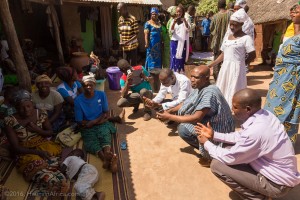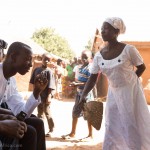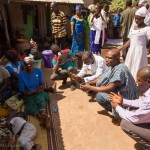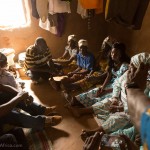Many Christian couples in northern Ghana do a traditional wedding before they have a church wedding. For most people it’s a decision based on finances. Church weddings are expensive – they buy Western clothes (suit, white gown), they hire musicians, hundreds of people attend expecting to be fed, a fancy cake is made, vehicles are rented, drinks are served, photographers & videographers are hired, and so on. Honestly, it bothers me that what they identify as a “Christian wedding” is mostly just a “Western wedding.” Most of the elements of their “church weddings” are not based on Scripture at all – just Western cultural traditions.
A Ghanaian traditional wedding, on the other hand, is a much simpler affair. It varies by ethnic group, but for the most part the groom visits the bride’s family with a delegation from his own family. They present gifts (some call it a dowry) to the senior men and women in her family. They officially request her hand in marriage and greet everyone in the family compound. The cost is significantly lower than a “church wedding.”
We recently attended a dear friend’s traditional wedding in the northwest. She and her husband are Christians but can’t afford the western-style wedding so they did the traditional one. They hope to one day do a church wedding when they have the funds. Some couples wait for years before wedding at church.
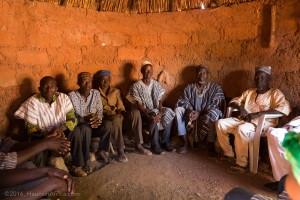
Our friend is Bimoba but her fiancée is Gonja (an ethnic group mostly found southwest of here) so his family had to travel a good distance to her village. Here’s a run down of the events:
After about 2 1/2 hours of waiting for various participants to arrive, the grooms’ family delegation entered a hut outside of the bride’s family compound and met with the elders. For about 20 minutes they talked and presented their gifts (mostly alcohol) to the men of her family. Then the bride came out with a special calabash bowl entered the men’s hut. There they talked some more, the elders blessed the marriage and she returned inside the courtyard.
Then the groom’s party entered the courtyard where all the women of the family were gathered. They entered the matriarch’s room where all the elderly women were sitting with the bride. The groom’s party presented a gift to the women (a suitcase full of new fabrics) and they then blessed the marriage.
When the groom and his family exited the room, the bride’s family had laid down cloths in front of the gate. To exit they must walk on the clothes – but to walk on the cloth means they have to pay a fine to their new in-laws. This begins the tradition of the “joking relationship” that exists between in-laws. If one didn’t know what was going on, they would have thought a fight was about to break out. The in-laws angrily yelled at the groom & his relatives to pay up and they argued that they had already paid and received the elders blessing. This escalated over about ten minutes but the truth is that it is all an act. In the end, the groom turned over an envelope of cash to the in-laws (they had planned for this from the start) and they were permitted to walk on the cloths and exit the courtyard.

We really enjoyed being a part of this traditional ceremony and are disappointed that the established view is that a proper “Christian marriage” has to be a big expensive ceremony held a church. Why not bring elements from the Bible and wed them with some of the traditional elements? I’m confident that a beautiful and powerful combination could be found.
